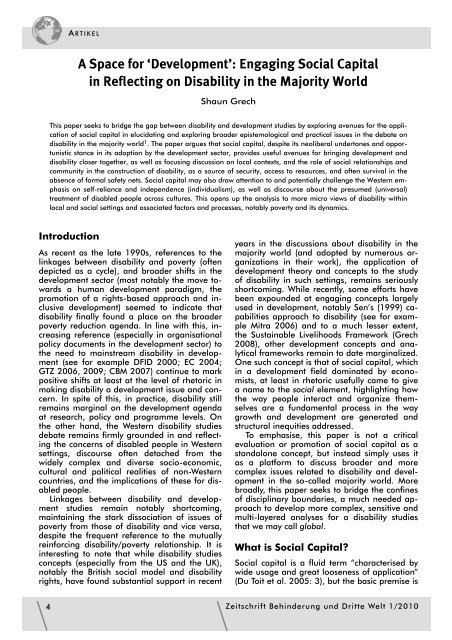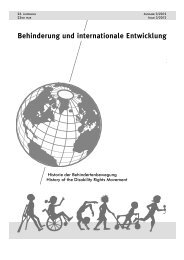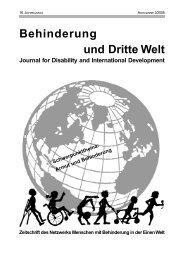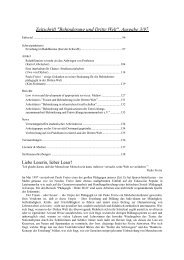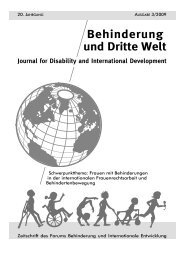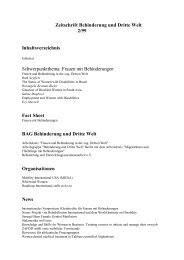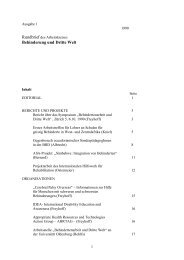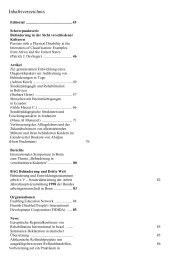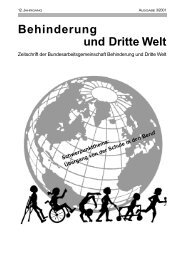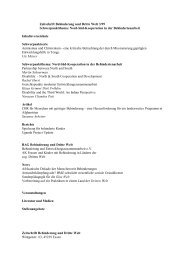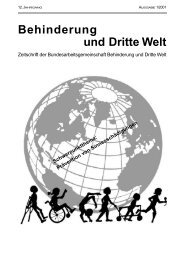Disaster and Disability in Bangladesh - Behinderung und Dritte Welt
Disaster and Disability in Bangladesh - Behinderung und Dritte Welt
Disaster and Disability in Bangladesh - Behinderung und Dritte Welt
You also want an ePaper? Increase the reach of your titles
YUMPU automatically turns print PDFs into web optimized ePapers that Google loves.
A RTIKELA Space for ‘Development’: Engag<strong>in</strong>g Social Capital<strong>in</strong> Reflect<strong>in</strong>g on <strong>Disability</strong> <strong>in</strong> the Majority WorldShaun GrechThis paper seeks to bridge the gap between disability <strong>and</strong> development studies by explor<strong>in</strong>g avenues for the applicationof social capital <strong>in</strong> elucidat<strong>in</strong>g <strong>and</strong> explor<strong>in</strong>g broader epistemological <strong>and</strong> practical issues <strong>in</strong> the debate ondisability <strong>in</strong> the majority world 1 . The paper argues that social capital, despite its neoliberal <strong>und</strong>ertones <strong>and</strong> opportunisticstance <strong>in</strong> its adoption by the development sector, provides useful avenues for br<strong>in</strong>g<strong>in</strong>g development <strong>and</strong>disability closer together, as well as focus<strong>in</strong>g discussion on local contexts, <strong>and</strong> the role of social relationships <strong>and</strong>community <strong>in</strong> the construction of disability, as a source of security, access to resources, <strong>and</strong> often survival <strong>in</strong> theabsence of formal safety nets. Social capital may also draw attention to <strong>and</strong> potentially challenge the Western emphasison self-reliance <strong>and</strong> <strong>in</strong>dependence (<strong>in</strong>dividualism), as well as discourse about the presumed (universal)treatment of disabled people across cultures. This opens up the analysis to more micro views of disability with<strong>in</strong>local <strong>and</strong> social sett<strong>in</strong>gs <strong>and</strong> associated factors <strong>and</strong> processes, notably poverty <strong>and</strong> its dynamics.IntroductionAs recent as the late 1990s, references to thel<strong>in</strong>kages between disability <strong>and</strong> poverty (oftendepicted as a cycle), <strong>and</strong> broader shifts <strong>in</strong> thedevelopment sector (most notably the move towardsa human development paradigm, thepromotion of a rights-based approach <strong>and</strong> <strong>in</strong>clusivedevelopment) seemed to <strong>in</strong>dicate thatdisability f<strong>in</strong>ally fo<strong>und</strong> a place on the broaderpoverty reduction agenda. In l<strong>in</strong>e with this, <strong>in</strong>creas<strong>in</strong>greference (especially <strong>in</strong> organisationalpolicy documents <strong>in</strong> the development sector) tothe need to ma<strong>in</strong>stream disability <strong>in</strong> development(see for example DFID 2000; EC 2004;GTZ 2006, 2009; CBM 2007) cont<strong>in</strong>ue to markpositive shifts at least at the level of rhetoric <strong>in</strong>mak<strong>in</strong>g disability a development issue <strong>and</strong> concern.In spite of this, <strong>in</strong> practice, disability stillrema<strong>in</strong>s marg<strong>in</strong>al on the development agendaat research, policy <strong>and</strong> programme levels. Onthe other h<strong>and</strong>, the Western disability studiesdebate rema<strong>in</strong>s firmly gro<strong>und</strong>ed <strong>in</strong> <strong>and</strong> reflect<strong>in</strong>gthe concerns of disabled people <strong>in</strong> Westernsett<strong>in</strong>gs, discourse often detached from thewidely complex <strong>and</strong> diverse socio-economic,cultural <strong>and</strong> political realities of non-Westerncountries, <strong>and</strong> the implications of these for disabledpeople.L<strong>in</strong>kages between disability <strong>and</strong> developmentstudies rema<strong>in</strong> notably shortcom<strong>in</strong>g,ma<strong>in</strong>ta<strong>in</strong><strong>in</strong>g the stark dissociation of issues ofpoverty from those of disability <strong>and</strong> vice versa,despite the frequent reference to the mutuallyre<strong>in</strong>forc<strong>in</strong>g disability/poverty relationship. It is<strong>in</strong>terest<strong>in</strong>g to note that while disability studiesconcepts (especially from the US <strong>and</strong> the UK),notably the British social model <strong>and</strong> disabilityrights, have fo<strong>und</strong> substantial support <strong>in</strong> recentyears <strong>in</strong> the discussions about disability <strong>in</strong> themajority world (<strong>and</strong> adopted by numerous organizations<strong>in</strong> their work), the application ofdevelopment theory <strong>and</strong> concepts to the studyof disability <strong>in</strong> such sett<strong>in</strong>gs, rema<strong>in</strong>s seriouslyshortcom<strong>in</strong>g. While recently, some efforts havebeen expo<strong>und</strong>ed at engag<strong>in</strong>g concepts largelyused <strong>in</strong> development, notably Sen’s (1999) capabilitiesapproach to disability (see for exampleMitra 2006) <strong>and</strong> to a much lesser extent,the Susta<strong>in</strong>able Livelihoods Framework (Grech2008), other development concepts <strong>and</strong> analyticalframeworks rema<strong>in</strong> to date marg<strong>in</strong>alized.One such concept is that of social capital, which<strong>in</strong> a development field dom<strong>in</strong>ated by economists,at least <strong>in</strong> rhetoric usefully came to givea name to the social element, highlight<strong>in</strong>g howthe way people <strong>in</strong>teract <strong>and</strong> organize themselvesare a f<strong>und</strong>amental process <strong>in</strong> the waygrowth <strong>and</strong> development are generated <strong>and</strong>structural <strong>in</strong>equities addressed.To emphasise, this paper is not a criticalevaluation or promotion of social capital as ast<strong>and</strong>alone concept, but <strong>in</strong>stead simply uses itas a platform to discuss broader <strong>and</strong> morecomplex issues related to disability <strong>and</strong> development<strong>in</strong> the so-called majority world. Morebroadly, this paper seeks to bridge the conf<strong>in</strong>esof discipl<strong>in</strong>ary bo<strong>und</strong>aries, a much needed approachto develop more complex, sensitive <strong>and</strong>multi-layered analyses for a disability studiesthat we may call global.What is Social Capital?Social capital is a fluid term “characterised bywide usage <strong>and</strong> great looseness of application”(Du Toit et al. 2005: 3), but the basic premise is4 Zeitschrift Beh<strong>in</strong>derung <strong>und</strong> <strong>Dritte</strong> <strong>Welt</strong> 1/2010


